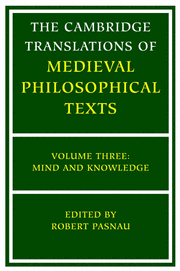Book contents
- Frontmatter
- Contents
- Acknowledgments
- General Introduction
- 1 ANONYMOUS (Arts Master c. 1225) The Soul and Its Powers
- 2 ANONYMOUS (Arts Master c. 1270) Questions on De anima I–II
- 3 BONAVENTURE Christ Our One Teacher
- 4 HENRY OF GHENT Can a Human Being Know Anything?
- 5 HENRY OF GHENT Can a Human Being Know Anything without Divine Illumination?
- 6 PETER JOHN OLIVI The Mental Word
- 7 WILLIAM ALNWICK Intelligible Being
- 8 PETER AUREOL Intuition, Abstraction, and Demonstrative Knowledge
- 9 WILLIAM OCKHAM Apparent Being
- 10 WILLIAM CRATHORN On the Possibility of Infallible Knowledge
- 11 ROBERT HOLCOT Can God Know More than He Knows?
- 12 ADAM WODEHAM The Objects of Knowledge
- Textual Emendations
- Bibliography
- Index
12 - ADAM WODEHAM The Objects of Knowledge
Published online by Cambridge University Press: 23 December 2009
- Frontmatter
- Contents
- Acknowledgments
- General Introduction
- 1 ANONYMOUS (Arts Master c. 1225) The Soul and Its Powers
- 2 ANONYMOUS (Arts Master c. 1270) Questions on De anima I–II
- 3 BONAVENTURE Christ Our One Teacher
- 4 HENRY OF GHENT Can a Human Being Know Anything?
- 5 HENRY OF GHENT Can a Human Being Know Anything without Divine Illumination?
- 6 PETER JOHN OLIVI The Mental Word
- 7 WILLIAM ALNWICK Intelligible Being
- 8 PETER AUREOL Intuition, Abstraction, and Demonstrative Knowledge
- 9 WILLIAM OCKHAM Apparent Being
- 10 WILLIAM CRATHORN On the Possibility of Infallible Knowledge
- 11 ROBERT HOLCOT Can God Know More than He Knows?
- 12 ADAM WODEHAM The Objects of Knowledge
- Textual Emendations
- Bibliography
- Index
Summary
Introduction
With Adam Wodeham (c. 1298–1358) we arrive at the zenith of subtlety and complexity in later medieval philosophy. An English Franciscan, Wodeham was deeply influenced by his predecessors in the Order, particularly Scotus, Ockham, Aureol, and Walter Chatton, all of whose views come in for criticism in the present selection. The lectures from which this selection is drawn (his Lectura secunda, or second lecture on Lombard's Sentences) appear to date from around 1330. What we have is a single manuscript containing a reportatio of those lectures: that is, an official classroom transcript never edited by Wodeham. This at least partly accounts for the obscurity of some sections.
Wodeham was a contemporary of Robert Holcot, and the present selection, like Translation II, concerns the things we have knowledge about. Initially, the question is whether the immediate object of knowledge is things or mental signs. Wodeham has little sympathy for the first answer, despite its immediate plausibility (§6 n.2). He also thinks it won't do to identify the objects of knowledge with signs (§§4–7). These latter sections of the question are immensely complex, and it is not always clear how the Latin should be construed, or whether it even is construable, as it stands. Keep in mind that by ‘signs,’ Wodeham means mental signs, and that he assumes from the start that these mental signs will be sentencelike “complexes” or “propositions.” (Holcot used this same terminology in Translation 11.) To say that knowledge concerns signs or a complex is to say that it concerns a sentence in the language of thought.
The most basic problem with this view is that such mental “propositions” are concrete, individual tokens of thought.
Information
- Type
- Chapter
- Information
- The Cambridge Translations of Medieval Philosophical Texts , pp. 318 - 352Publisher: Cambridge University PressPrint publication year: 2002
